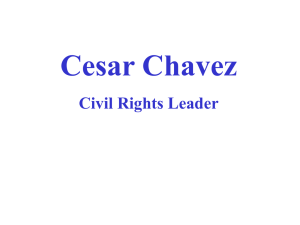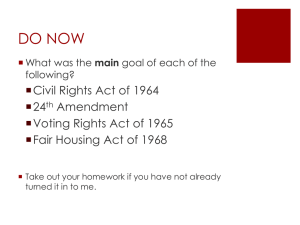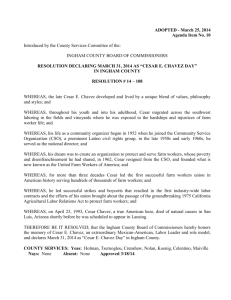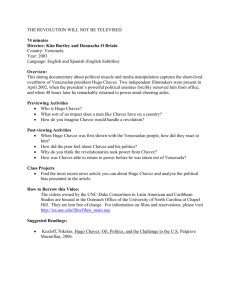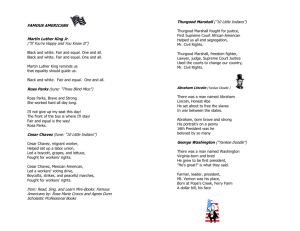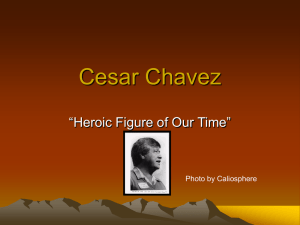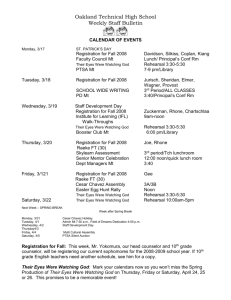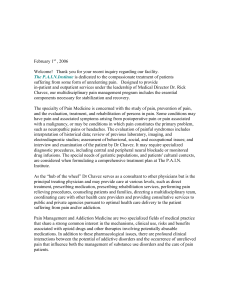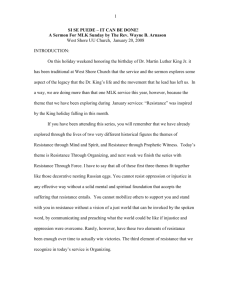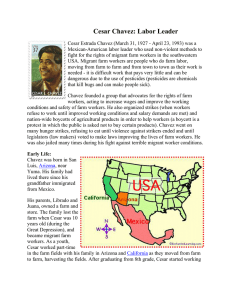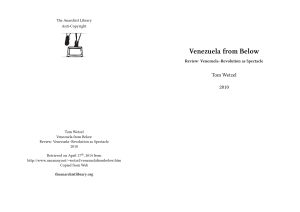Cesar_Chavez.doc
advertisement
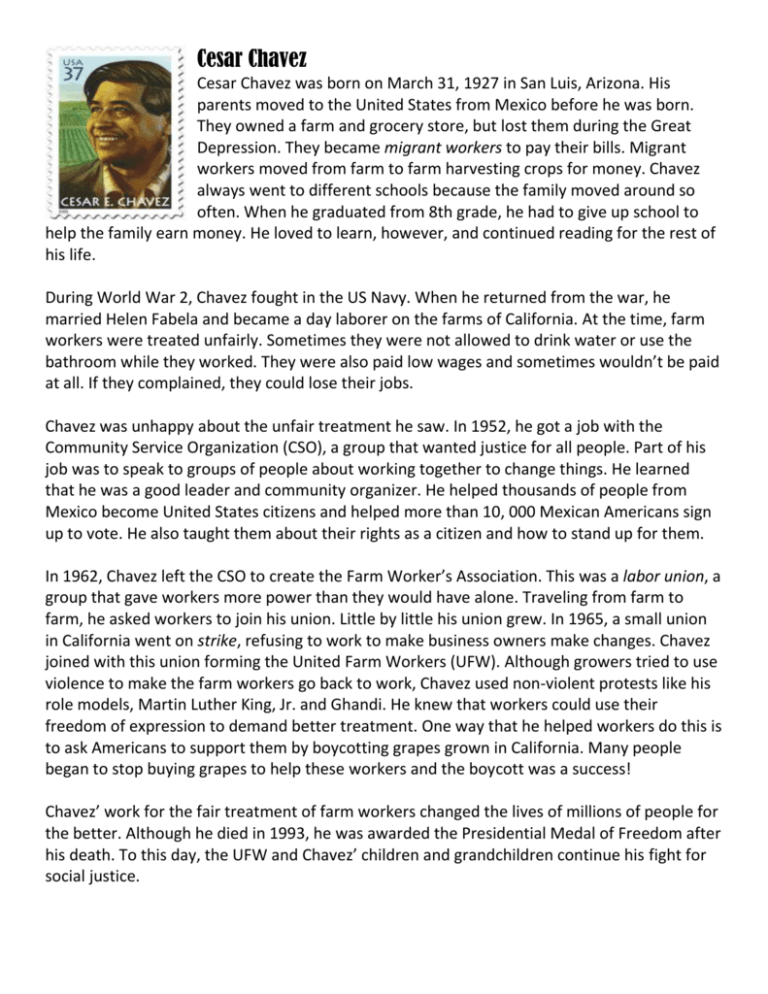
Cesar Chavez Cesar Chavez was born on March 31, 1927 in San Luis, Arizona. His parents moved to the United States from Mexico before he was born. They owned a farm and grocery store, but lost them during the Great Depression. They became migrant workers to pay their bills. Migrant workers moved from farm to farm harvesting crops for money. Chavez always went to different schools because the family moved around so often. When he graduated from 8th grade, he had to give up school to help the family earn money. He loved to learn, however, and continued reading for the rest of his life. During World War 2, Chavez fought in the US Navy. When he returned from the war, he married Helen Fabela and became a day laborer on the farms of California. At the time, farm workers were treated unfairly. Sometimes they were not allowed to drink water or use the bathroom while they worked. They were also paid low wages and sometimes wouldn’t be paid at all. If they complained, they could lose their jobs. Chavez was unhappy about the unfair treatment he saw. In 1952, he got a job with the Community Service Organization (CSO), a group that wanted justice for all people. Part of his job was to speak to groups of people about working together to change things. He learned that he was a good leader and community organizer. He helped thousands of people from Mexico become United States citizens and helped more than 10, 000 Mexican Americans sign up to vote. He also taught them about their rights as a citizen and how to stand up for them. In 1962, Chavez left the CSO to create the Farm Worker’s Association. This was a labor union, a group that gave workers more power than they would have alone. Traveling from farm to farm, he asked workers to join his union. Little by little his union grew. In 1965, a small union in California went on strike, refusing to work to make business owners make changes. Chavez joined with this union forming the United Farm Workers (UFW). Although growers tried to use violence to make the farm workers go back to work, Chavez used non-violent protests like his role models, Martin Luther King, Jr. and Ghandi. He knew that workers could use their freedom of expression to demand better treatment. One way that he helped workers do this is to ask Americans to support them by boycotting grapes grown in California. Many people began to stop buying grapes to help these workers and the boycott was a success! Chavez’ work for the fair treatment of farm workers changed the lives of millions of people for the better. Although he died in 1993, he was awarded the Presidential Medal of Freedom after his death. To this day, the UFW and Chavez’ children and grandchildren continue his fight for social justice. Name _____________________________ Directions: Answer the following questions about Cesar Chavez. 1) Where did Cesar Chavez’ family move to America from? a) Puerto Rico b) Cuba c) Mexico d) Mexico City 2) Which of the following does NOT show unfair treatment of farm workers? a) not having a restroom break c) not getting paid b) working in the hot sun without water d) not being able to watch television 3) Which of the following is part of the job Chavez had at the CSO? a) speaking with people c) planting trees b) harvesting fruit d) all of the above 4) Which of the following is NOT something Chavez did while with the CSO? a) He helped Mexican Americans learn their rights and how to stand up for them. b) He helped Mexican Americans get factory jobs. c) He helped Mexicans become American citizens. d) He helped thousands of Mexicans sign up to vote. 5) Which of the following happens when there is a strike? a) Workers work harder than ever before. b) Workers refuse to work so business owners will make changes. c) Business owners fire their workers. d) Business owners give their workers more money. 6) Why did Chavez look up to Martin Luther King, Jr. and Ghandi? a) They both believed in using non-violence to make change. b) They both believed in using violence to fight for change. c) He met them when he was a child. d) His parents always talked about them to him as a child. 7) What is the best meaning of a labor union? a) A group of people that lead protests. b) A group of people that hold meetings once a month. c) A group of people that work together. d) A group of people that gives workers more power than they would have alone. 8) What did people do to show support for the California grape workers? a) They bought more grapes. b) They bought the same amount of grapes as they always did. c) They stopped buying grapes. d) They didn’t do anything to support the workers. Cesar Chavez Answer Key 1) c 2) d 3) a 4) b 5) b 6) a 7) d 8) c
